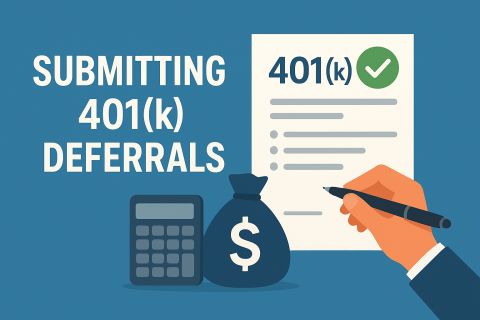Submitting 401(k) Deferrals: The Rules

If your small business sponsors a 401(k) plan, one of your key responsibilities is making sure that employee deferrals are deposited into the plan timely and accurately. The IRS and Department of Labor (DOL) take this very seriously, and late deposits — even by a few days — can lead to compliance issues, penalties, and the need for corrective filings. Here’s a review of 401(k) deferrals and what you need to know:
What Are 401(k) Deferrals?
Employee deferrals are the amounts employees elect to withhold from their paychecks to contribute to their 401(k) accounts. As the employer, you're responsible for transferring these funds from your payroll into the pooled or directed 401(k) plan account(s).
What Is the Deadline for Depositing Deferrals?
The rule is simple in theory but strict in practice: Small businesses (fewer than 100 participants) have a 7-business-day safe harbor: If you deposit employee contributions and loan repayments within 7 business days after the date you withhold them from payroll, you are considered in compliance.
Large plans (100 or more participants) must deposit deferrals as soon as they can reasonably be segregated from general assets, which could be as soon as a few days after payroll.
Why Timely Deposits Matter
Late deposits are considered a “prohibited transaction” because you’re holding employee funds in company accounts. Possible consequences include:
- Making corrective contributions to affected employees
- Filing a Form 5330, “Return of Excise Taxes Related to Employee Benefit Plans” with the IRS
- Paying excise taxes
- Potential plan audits or DOL scrutiny
Best Practices for Small Business Owners
- Automate your payroll and 401(k) deposits to avoid delays
- Document your deposit timeline: keep clear records of when funds were withheld and deposited
- Review your payroll schedule with your 401(k) provider to align timelines
- Train your staff (or third-party payroll provider) on the importance of timely submission
Need Help?
As your trusted CPAs and accountants, we can help you review your deposit practices, coordinate with your payroll provider, and ensure compliance with IRS and DOL regulations. If PPG Partners completes your payroll and submits deferrals on your behalf, you can be sure we are submitting these timely.
Bottom line: A well-run 401(k) plan not only avoids penalties but also builds employee trust and supports retirement readiness.
